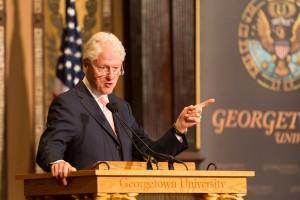
Former President Bill Clinton (SFS ’68) emphasized the importance of inclusiveness in constructing a vision for the future during a speech at Gaston Hall Tuesday, continuing his ongoing Georgetown lecture series.
The hour-long lecture was the third annual installment of the Clinton Lectures, a series of four lectures by the 42nd president that reflect on his time in public service and offer advice on composing a life devoted to the public good. The lecture series began in April 2013 and will conclude next year. Clinton previously gave a lecture series at Georgetown in 1991 during his first presidential campaign.
University President John J. DeGioia introduced Clinton, lauding the former president’s wealth of experience in public service.
“We come together today and on two other occasions in the series to engage the wisdom and insights of one of the most accomplished global leaders of our time to hear his perspective from a lifetime of service to our nation,” DeGioia said. “President Clinton turns … to speak to all of you, future leaders of our nation, to think deeply about our own responsibilities about where we are, where we want to go and how we propose to get there.”
In his 2013 address, Clinton identified four areas of focus for his addresses that he said would give a well-rounded understanding of public service: people, policies, politics and purpose. While his first two lectures centered on the necessity of understanding people and the challenges involved in policymaking respectively, his third discussed the importance of maintaining purpose in public service through a strong vision for the future.
“There is plenty of politics when the election is over in trying to implement policy. And there is plenty of politics if you’re not in elected office,” Clinton said. “In every public service success, leadership requires a vision for a better future where the purpose of public service is made plain in the circumstances of the moment, a clear understandable plan to realize that vision and the ability to actually implement changes by the inclusion of all stakeholders in the process.”
The lecture was bookended by three standing ovations from an audience filled to capacity. While the first 13 rows on the left side of the bottom level were reserved for registered guests, including friends and classmates of Clinton, students filled the right side of the bottom level, as well as the balcony seating. Among those in attendance were Secretary of Agriculture Tom Vilsack and Congressman John Delaney (D-Md.).
True to his School of Foreign Service heritage, Clinton spent a significant portion of his lecture giving international examples of what he said were strong leaders with inclusive visions that transformed their countries.
After reflecting on the development of the European community, the economic reforms in Singapore and the democratic reforms in Mexico throughout the 1990s, Clinton discussed the “radical inclusion” of the reconciliation policies practiced by Nelson Mandela in South Africa, who put the leaders of the apartheid parties in his cabinet against the will of his advisers.
“Mandela asked, ‘Is there one thing we can run by ourselves? No.’ … You’d be surprised if someone gave a speech like that in Washington,” Clinton said. “Mandela proved that inclusion is better than constant conflict.”
In addition to government actors, Clinton highlighted independent citizen actors for their commitment to inclusion, including the Bill and Melinda Gates Foundation.
To further emphasize the importance of inclusion, Clinton mentioned the Islamic State, which he called a non-governmental organization.
“If they decide you’re an apostate, they’ll just kill you. That’s why they kill other Muslims,” Clinton said. “ISIS is the opposite. They have a vision. They have a strategy. They think they’re right. But they are anti-inclusion to the extreme.”
Graham Kaluzny (COL ’18), who attended the lecture after standing in line at 6 a.m., appreciated the tangible examples Clinton provided.
“I thought he provided really good examples. I know that I skipped an international relations lecture to be here, but I think I probably learned more here than I would have in my IR lecture,” Kaluzny said.
After his specific examples, Clinton drew back and explained his personal purpose in a three-pronged vision.
“I always wanted at the end of my life to be able to answer with a resounding yes three questions: Are people better off than when you started? Do children have a broader future? Are things coming together instead of being torn apart? To me, all the rest is background noise,” Clinton said. “I tried to develop the political skills and the humility to constantly develop policy that would be enable me personally to say that.”
Echoing former Georgetown professor Carroll Quigley, whom Clinton has often credited as an inspiration, Clinton said that what made this civilization unique was a hope that the future could be better than the present and required people coming together through public service to make that hope reality.
“I can’t tell you what your purpose should be, but I can tell you you’ll have a lot more fun in your life if you have one and if it’s bigger than you,” Clinton said. “We all find our purpose in our own way, but if you work at it, it will come.”
Fr. Otto Hentz, S.J., who taught Clinton in his first year of teaching, moderated the question-and-answer session, which featured pre-screened questions from students. During the session, Clinton offered his annual book recommendations: “Heirs to Forgotten Kingdoms,” by Gerard Russell, and “Meditations of Marcus Aurelius.”
Clinton also reflected on his time at Georgetown, which he said imbued him with an appreciation for public service.
“I was here with fascinating people. I was here at a fascinating time. But it affected me mostly because of the teachers I had,” Clinton said. “I doubt very seriously if I would have become president if I had not come to Georgetown.”




















